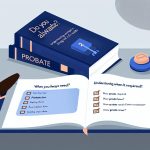Understanding Probate: What It Means for Property Owners
Table of Contents
- Understanding Probate: What It Means for Property Owners
- When Is a Solicitor Essential for Probate?
- DIY Probate vs Solicitor-Led Probate: Which Saves You More?
- How to Choose the Right Solicitor for Your Probate Needs
- Debunking Common Probate Myths Among Property Owners
- Tax Implications of Probate and How Solicitors Can Protect Your Assets
- Future Trends in Probate Law: What Property Owners Should Expect
- Protecting Your Property from Residential Care Funding Claims During Probate
Introduction
Navigating probate in the UK can be complex, especially for property owners looking to protect their assets from tax implications and residential care funding. This guide breaks down everything you need to know about whether you need a solicitor for probate, providing data-driven insights and practical advice to help you make well-informed decisions.
Understanding Probate: What It Means for Property Owners
Common Mistakes of Not Hiring a Solicitor When Needed in Probate
Undertaking probate without the expertise of a solicitor can result in several costly and avoidable errors, particularly in matters involving property. Below are some of the most frequent pitfalls:
- Incorrect Assessment of Probate Necessity: Executors may either apply for probate unnecessarily or fail to apply when it is essential, especially for property held solely by the deceased, causing delays or legal complications.
- Undervaluing Estate Assets: Without professional valuations, it is common to underestimate property values, leading to incorrect inheritance tax calculations and potential HMRC penalties.
- Mishandling Complex Assets: Estates with foreign properties, business interests, or trusts require specialist knowledge. Missteps can result in the improper application of laws, disputes, or financial losses.
- Poor Documentation and Administration: Failing to locate the original will or submitting incomplete probate forms can lead to delays or rejections.
- Overlooking Beneficiary Rights and Potential Disputes: Excluding dependants or failing to communicate with potential heirs may provoke legal challenges, complicating estate distribution.
How to Recover from or Avoid Costly Probate Errors
While some errors may be irreversible, proactive steps can help mitigate risks and prevent significant losses:
- Engage a Solicitor Early: Consult a specialist solicitor to review and correct applications, advise on tax obligations, and guide the executor through property-related complexities.
- Obtain Professional Property Valuations: Independent valuers can provide accurate assessments essential for correct tax reporting and avoiding penalties.
- Gather and Secure Key Documents: Organise the original will, property deeds, bank statements, and pension details to reduce administrative errors.
- Adhere to Tax Rules and Reliefs: Work with professionals to claim relevant exemptions and reliefs, minimising tax burdens effectively.
- Manage Disputes Promptly: Encourage open dialogue between beneficiaries and use mediation services to resolve conflicts before they escalate.
Ultimately, probate involving property often demands legal expertise to navigate the complex intersection of property law, taxation, and family rights.
When Is a Solicitor Essential for Probate?
DIY Probate vs Solicitor-Led Probate: Which Saves You More?
When deciding between handling probate yourself or hiring a solicitor, it is important to weigh costs, timeframes, and outcomes carefully. Each approach has its merits depending on the estate’s complexity and the executor’s confidence and capabilities.
Cost Comparison
- DIY Probate: The lowest upfront cost option, with application fees starting from around £215. Executors manage all paperwork themselves but assume responsibility for any errors.
- Fixed-Fee Specialist Services: These cost from approximately £595 to £2,750, offering financial predictability for moderate complexity estates.
- Solicitor-Led Probate: Charged as a percentage of the estate value—ranging from 1% up to 5%. Solicitors handle the entire process, minimising errors.
- Banks and Other Institutions: Offer probate services at fixed fees or percentage rates, usually more expensive than specialist probate firms.
Timeframes and Effort
- DIY Probate: Can be time-consuming, as executors navigate forms and tax without expertise, risking delays.
- Solicitor-Led Probate: Generally faster for complex estates due to familiarity with procedures, reducing the executor’s administrative burden.
Outcomes and Risk Management
- Legal Accuracy: DIY probate carries a higher risk of errors, potentially resulting in penalties or delays.
- Tax Compliance: Solicitors often provide advice to minimise tax liability and ensure legal compliance.
- Emotional Stress: Managing probate personally while grieving can be taxing. Professional assistance can alleviate this burden.
- Liability: Executors bear full liability when proceeding alone, while solicitors assume responsibility for their errors.
| Situation | Why a Solicitor Is Essential |
| Estate exceeds the Inheritance Tax threshold (£325,000 for 2024/25) | Complex tax calculations, risk of costly errors, need for correct tax planning and compliance |
| Estate is earning regular income or has complicated tax affairs | Requires specialist tax knowledge and handling of ongoing income and liabilities |
| No will (intestacy) and estate is complex | Navigating intestacy rules and multiple beneficiaries can be legally challenging |
| Doubts about the validity or clarity of the will | Legal expertise needed to interpret ambiguous or contested wills |
| Disputes or challenges to the will or estate distribution | Solicitors can mediate, resolve disputes, and protect the executor from personal liability |
| Estate includes assets held in trust or creates a trust for minors | Trust law is complex and errors can have serious consequences |
| Estate is insolvent (bankrupt) or has significant debts | Specialist advice required to avoid personal liability and manage creditor claims |
| Estate includes foreign property or assets | Cross-border legal and tax issues require professional handling |
| Deceased lived outside the UK for tax purposes | International tax and legal considerations add complexity |
| Deceased owned or had interests in a business | Business assets require valuation, transfer, and possible tax implications |
| Executor lacks time, confidence, or experience | Reduces risk of mistakes and personal liability; solicitors have professional indemnity insurance |
| Multiple or hard-to-locate beneficiaries | Solicitors can trace beneficiaries and ensure correct distribution |
| Need for detailed tax planning or mitigation of errors/delays | Expert advice can prevent costly mistakes and ensure efficient administration |
Considerations for Property Owners
With property often the most valuable estate asset, professional guidance is beneficial. Valuation complexities or planning to mitigate tax can create pitfalls. For estates over inheritance tax thresholds (£325,000 and above), solicitor-led probate may provide crucial expertise.
Summary Recommendations
- Choose DIY probate if: The estate is small and straightforward, and you are confident in handling forms and tax returns.
- Consider fixed-fee probate services if: The estate is mid-sized or you want professional help without full solicitor costs.
- Opt for solicitor-led probate if: The estate is complex, involves properties, or you prefer professional peace of mind.
DIY Probate vs Solicitor-Led Probate: Which Saves You More?
Qualifications to Confirm in a Probate Solicitor
- Professional Certifications: Ensure the solicitor holds recognised qualifications such as diplomas from the Society of Trust and Estate Practitioners (STEP).
- Solicitors Regulation Authority (SRA) Registration: Verify their registration on the SRA register, confirming completion of necessary legal education.
- Background Checks: A reputable probate solicitor will have cleared DBS checks and maintain a clean professional record.
Key Questions to Ask Potential Probate Solicitors
- Experience with Probate Cases: Enquire about their experience with complex estates and what parts of the process they will manage.
- Fee Structure Transparency: Request a detailed breakdown of fees and confirm how costs will be paid from the estate.
- Client References: Ask for references to gauge reliability and communication style.
- Understanding and Communication: Check if they explain key legal terms in accessible language.
Red Flags to Avoid When Selecting a Probate Solicitor
- Lack of Transparency: Beware if the solicitor is vague about fees or unwilling to discuss the process clearly.
- Disciplinary Issues: Check for misconduct records via the SRA or professional bodies.
- Outsourcing Without Oversight: Be cautious if they delegate key parts of your case without clear communication.
- Poor Communication: Reluctance to provide references or explain the process signals potential issues.
Additional tip: Use the SRA’s official register to cross-check the solicitor’s credentials and disciplinary history.
How to Choose the Right Solicitor for Your Probate Needs
Understanding the Probate Process and Property Owner Challenges in the UK
Navigating probate involves a clear set of government steps, yet property owners often face unique challenges that complicate the process, highlighting the need for awareness and due diligence.
The Probate Process: Step-by-Step
- Register the Death: Obtain an official death certificate, essential for all subsequent legal actions.
- Assess the Estate’s Value: Calculate the total value of the estate; probate is needed if the net value exceeds £5,000.
- Settle Inheritance Tax (IHT): Complete tax forms and pay taxes before applying for probate if IHT is due.
- Apply for Probate: Submit forms PA1P or PA1A, including supporting documents, with a fee for estates over £5,000.
- Obtain the Grant of Probate: This legal document empowers executors to collect assets, pay debts, and distribute the estate.
Property Ownership and Probate: Key Considerations
The type of property ownership impacts probate requirements:
- Joint Tenants: Property passes to the surviving owner automatically; probate is not required.
- Tenants in Common: Probate is necessary to transfer the deceased’s share, involving complexities.
Common Challenges for Property Owners During Probate
- Outstanding Mortgages: Executors must ensure mortgage payments continue to avoid repossession.
- Beneficiary Disputes: Disagreements over property can cause delays; mediation often helps resolve them.
- Form A Restrictions: A Form A restriction requires appointing a second trustee for the deceased’s share.
Additional Practical Tips
- Probate timelines range from six months to a year, but delays are common due to mistakes or disputes.
- Seeking legal guidance is advisable if the estate involves multiple beneficiaries or complex ownership structures.
- Clear communication facilitates smoother asset distribution, safeguarding property owners’ interests.
Understanding these nuances aids property owners and executors in managing probate efficiently while protecting estate assets.
Debunking Common Probate Myths Among Property Owners
Understanding the Tax Implications of Probate for Property Owners
Probate intersects with inheritance tax (IHT), a major concern for UK property owners. From April 2025, the UK’s IHT system will shift to a residency-based model, affecting taxation on properties.
Residency-Based Inheritance Tax: Key Changes for Property Owners
- Long-term residents—those who have been UK residents for 10 or more of the last 20 tax years—will be liable to IHT on their worldwide assets.
- A tail period applies to those who leave the UK, maintaining IHT liability on worldwide assets for a period, depending on residency duration.
Thresholds and Tax Rates Affecting Property Owners
- The standard nil-rate band remains £325,000, with the additional Residence Nil-Rate Band offering up to £175,000 extra relief.
- Assets above these thresholds face a 40% tax rate, posing substantial tax bills without careful planning.
How Solicitors Can Optimise Estate Plans to Minimise Tax Liabilities
Expert solicitors specialising in probate and estate planning help clients minimise IHT exposure, protecting assets:
- Review Residency Status and Exposure: Assess qualification as a long-term UK resident for planning purposes.
- Utilise the Residence Nil-Rate Band Efficiently: Structure property ownership to maximise nil-rate bands, shielding property value.
- Implement Trusts and Gifting Strategies: Recommend suitable trusts or gifting options to reduce taxable estates.
- Plan for Potential Care Home Fees: Design plans to safeguard property from sale for care costs through appropriate trusts.
- Prepare for the £325,000 Nil-Rate Band Freeze: Transfer assets during lifetime to reduce tax burdens.
Practical Examples
For a homeowner in London with a property valued at £2 million, planning could reduce IHT liability significantly. Solicitors might advise sharing the property into trusts.
Expatriates should consult solicitors about the tail rule to avoid unexpected IHT liabilities on abroad assets.
Engaging a knowledgeable solicitor early can protect your property portfolio and legacy from excessive taxation.
Tax Implications of Probate and How Solicitors Can Protect Your Assets
Emerging Trends in UK Probate Law and Digital Innovations
The landscape of probate law in the UK is evolving due to legal reforms and digital technologies, impacting property owners and solicitors. The Wills Bill 2025 introduces electronic Wills authenticated through blockchain technology, simplifying Will creation and enhancing security.
Remote witnessing through video calls makes estate planning more convenient, and reforms lower the age for making a Will to 16.
Digital Streamlining of Probate Administration
The UK government’s online probate application system now processes approximately 80% of claims, offering benefits such as:
- Online case tracking and real-time communication
- Integration with HMRC for inheritance tax processing
- Support for users less comfortable with digital tools
This shift means faster probate processes and reduced administrative burdens.
Impact on Solicitors and Legal Services
Solicitors must embrace technological tools like encrypted communications and digital estate vaults to remain competitive and secure client data.
Legal firms are investing in technology and staff training to offer digital-first, personalised services.
Practical Implications for UK Property Owners
Property owners benefit from enhanced professional services with digital tools safeguarding assets against fraud. With efficient applications, they can protect estates and prepare for care funding challenges.
Solicitors guide clients through this digital landscape, maximising estate value and ensuring legal compliance.
Future Trends in Probate Law: What Property Owners Should Expect
Protecting Your Property from Residential Care Funding Claims During Probate
Residential care fees can threaten property assets during probate. Solicitors deploy legal tools to shield homes and estates from Local Authority funding claims.
Asset Protection Trusts
Solicitors often recommend Asset Protection Trusts, transferring property ownership while allowing rights retention. Key types include:
- Home Protection Trusts: Protect property in a will, preventing it from care fee assessments.
- Discretionary Trusts: Allow flexible asset allocation, excluding property’s value from care funding means testing.
- Life Interest Trusts: Let a beneficiary live in the home while preserving its capital value for other heirs.
These trusts comply with UK law, maximising protection without risking accusations of “asset deprivation.”
Protective Property Trusts for Couples
A Protective Property Trust safeguards half the home’s value if a partner enters care. Solicitors ensure these trusts are:
- Established before care needs to avoid Local Authority challenges.
- Structured genuinely for estate planning beyond fee avoidance, ensuring legal robustness.
- Structured with a life interest, allowing a partner to remain living in the property.
Additional Legal Strategies and Solicitor Roles
Beyond trusts, solicitors advise on:
- Timing and Documentation: Early protection measures prevent accusations of asset deprivation.
- Capital Thresholds: Inform about thresholds (£23,250 as of 2025) and structure assets to remain within limits.
- Interplay with Probate Law: Create estate plans where trusts ease property transfer and limit care fee exposure.
Solicitors navigate this complex area, drafting trust instruments and guiding on compliance with Care Act funding rules.
Protecting Your Property from Residential Care Funding Claims During Probate
Protecting Your Assets from Tax and Residential Care Funding
Safeguarding your property and estate from inheritance tax and residential care costs is crucial. In the UK, trusts and ownership restructuring are effective tools for asset protection.
Trusts separate ownership and control, shielding assets from care fee assessments and creditors while offering tax benefits. Types of trusts include:
- Protective Property Trust: Preserves half the home’s value from care fee assessments, safeguarding beneficiaries.
- Life Interest Trust: Lets beneficiaries live in the property, preserving capital while shielding it from care costs.
- Discretionary Trust: Allows trustees to distribute assets flexibly, protecting against claims but with tax implications.
- Bare Trusts: Transfer assets to beneficiaries, offering straightforward protection.
Beyond trusts, restructuring or transferring property into trusts or companies can protect assets from care assessments or creditor claims. Planning must avoid rules on asset deprivation, negating protection if transferred too late.
Key considerations for protecting assets:
- Set up trusts early to prevent asset deprivation challenges.
- Regularly review estate plans with a probate or elder law solicitor.
- Understand trust tax implications, as laws vary based on circumstances.
- Use trusts to maintain property access while protecting capital, particularly regarding care funding.
Legal professionals ensure tailored protection strategies, maximising estate security against care fees and inheritance tax.
Sources
- Barcan Kirby Solicitors – Risks of DIY Probate
- My Probate Solicitors – Why Do I Need a Probate Solicitor?
- Marsons Solicitors – Costly Probate Mistakes
- UK Probate Service
- MoneySavingExpert – Guide to Probate Costs and Process
- GOV.UK – Applying for a Probate
- Niebla Probate Firm – 10 Must-Ask Questions Before Hiring a Probate Lawyer
- The Complete University Guide – How to Become a Solicitor
- Probate Without a Will: What Happens When Someone Dies Intestate? – 12 February 2026
- The True Cost of Probate in the UK – Fees, Taxes and Hidden Expenses – 9 February 2026
- How Long Does Probate Take in the UK? Realistic Timelines and Delays – 6 February 2026






